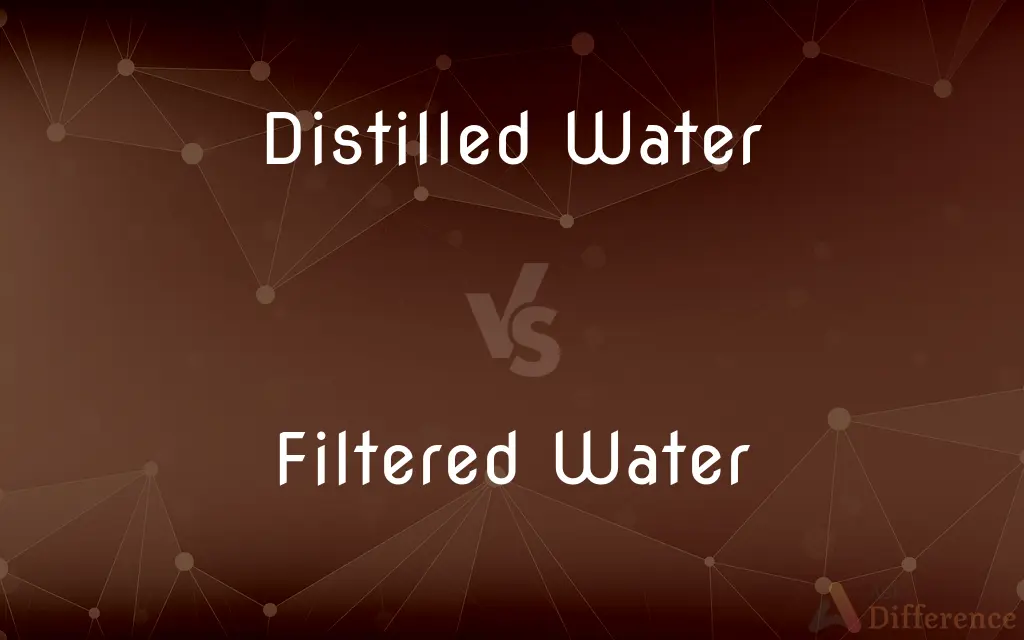Distilled Water vs. Filtered Water — What's the Difference?
By Urooj Arif & Maham Liaqat — Published on February 26, 2024
Distilled water is vaporized and condensed to remove impurities and minerals, offering high purity, while filtered water passes through a barrier to remove contaminants but retains beneficial minerals.

Difference Between Distilled Water and Filtered Water
Table of Contents
ADVERTISEMENT
Key Differences
Distilled water is produced by boiling water and then condensing the steam back into a liquid. This process removes impurities and minerals from the water, making it exceptionally pure. Distillation eliminates a wide range of contaminants, including bacteria, viruses, chemicals, and heavy metals. However, this also means that beneficial minerals like calcium and magnesium are removed, leading to a flat taste. Distilled water is often used in medical and industrial settings where high purity is required.
Filtered water, on the other hand, is created by passing water through one or more filters that capture contaminants. These filters can be made from charcoal, ceramic, or other materials and are designed to remove specific impurities such as chlorine, lead, and pesticides. The filtering process can vary in complexity, from simple pitchers to sophisticated whole-house systems. Unlike distillation, filtration does not remove all minerals, preserving those that are beneficial for health and contributing to the water's taste.
The choice between distilled and filtered water depends on the intended use and personal preference. Distilled water's purity makes it suitable for applications where mineral content can cause problems, such as in humidifiers or in certain medical devices. Filtered water, with its retained mineral content, is generally preferred for drinking and cooking, as it supports health and offers a more pleasant taste.
Both distilled and filtered water provide safer alternatives to tap water, especially in areas where it may be contaminated. However, for everyday consumption, many choose filtered water for its balance of purity and mineral content, while distilled water is selected for specific needs that require the highest level of purity.
Comparison Chart
Purification Process
Boiling and condensation to remove impurities
Passing through filters to remove contaminants
ADVERTISEMENT
Mineral Content
None, minerals are removed
Retains beneficial minerals
Taste
Flat, due to lack of minerals
Better, due to presence of minerals
Uses
Medical devices, humidifiers, certain industrial processes
Drinking, cooking, general household use
Removes
Bacteria, viruses, chemicals, heavy metals
Chlorine, lead, pesticides (varies by filter)
Cost
Generally higher due to energy-intensive process
Varies, depending on filtration system
Environmental Impact
High energy consumption in distillation process
Lower, especially with reusable filter systems
Health Benefits
Pure, but lacks minerals necessary for health
Balances purity with essential mineral content
Compare with Definitions
Distilled Water
Has a flat taste due to lack of minerals.
He noticed that coffee made with distilled water tasted somewhat flat.
Filtered Water
Water cleaned by passing through one or more filters.
Their kitchen tap is fitted with a filter, providing clean drinking water.
Distilled Water
Suitable for sensitive equipment.
To prolong its lifespan, they filled the humidifier with distilled water.
Filtered Water
Retains beneficial minerals.
Filtered water tastes better and is healthier, thanks to the minerals it retains.
Distilled Water
Produced by boiling water and condensing steam.
Distilled water is made by capturing steam, ensuring it's free of impurities.
Filtered Water
Can vary in purity based on the filter used.
Investing in a high-quality water filter can significantly improve your water's taste and safety.
Distilled Water
Free from contaminants and minerals.
Distilled water is recommended for use in laboratories due to its purity.
Filtered Water
Removes specific impurities like chlorine and lead.
The water filter ensures their drinking water is free from harmful contaminants.
Distilled Water
Water that has been purified through distillation.
She used distilled water in her iron to prevent mineral buildup.
Filtered Water
Preferred for drinking and cooking.
For cooking, she always uses filtered water to enhance the food's flavor.
Common Curiosities
How often should I replace my water filter?
Replacement frequency varies by filter type and water usage but generally ranges from every 2 months to 6 months. Always follow the manufacturer's recommendations.
Is distilled water safe to drink?
Yes, distilled water is safe to drink, but it lacks minerals that are beneficial to health.
Can filtered water remove all contaminants?
The effectiveness of filtered water in removing contaminants depends on the filter type. Some advanced filters can remove a wide range of impurities, but no filter eliminates everything.
Is it expensive to produce distilled water at home?
Producing distilled water at home can be energy-intensive and potentially more costly than filtering, due to the need for a distillation unit and the electricity to run it.
Why does distilled water have a flat taste?
The flat taste of distilled water is due to the absence of minerals, which contribute to the water's flavor.
How do I know if I need a water filter?
If your tap water has an unpleasant taste, odor, or you're concerned about contaminants, a water filter can improve its quality and safety.
Are there health risks associated with drinking distilled water long-term?
Long-term consumption of distilled water may lead to mineral deficiencies if not compensated for with a balanced diet or mineral supplements.
Can boiling water replace distillation?
Boiling water can kill bacteria and viruses but does not remove other contaminants like heavy metals or chemicals, which distillation does.
What are the environmental impacts of using distilled water?
The main environmental impact of distilled water comes from the energy required for the distillation process, which can contribute to carbon emissions.
Can I use filtered water in appliances that recommend distilled water?
Using filtered water instead of distilled can lead to mineral buildup over time. It's best to follow the manufacturer's recommendations for appliance care.
Share Your Discovery

Previous Comparison
Hard Wax vs. Soft Wax
Next Comparison
Rafael Nadal vs. Roger FedererAuthor Spotlight
Written by
Urooj ArifUrooj is a skilled content writer at Ask Difference, known for her exceptional ability to simplify complex topics into engaging and informative content. With a passion for research and a flair for clear, concise writing, she consistently delivers articles that resonate with our diverse audience.
Co-written by
Maham Liaqat












































